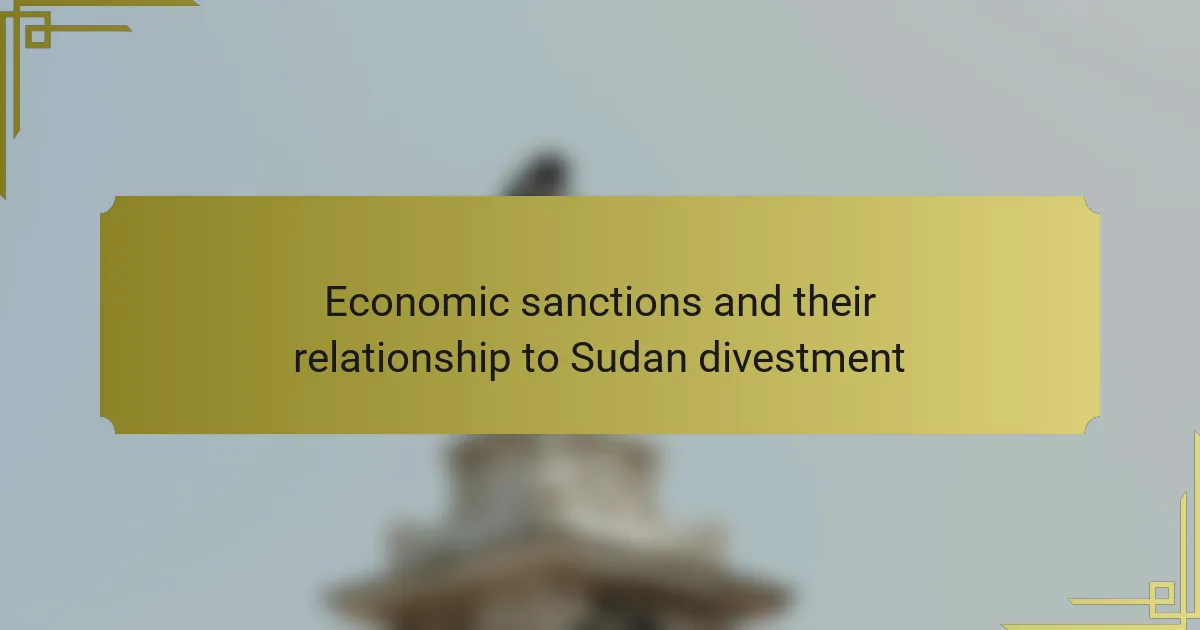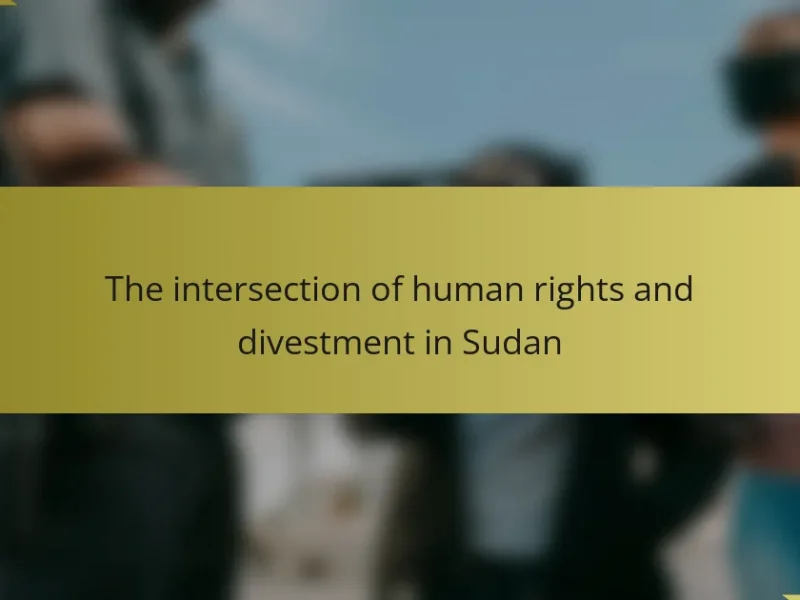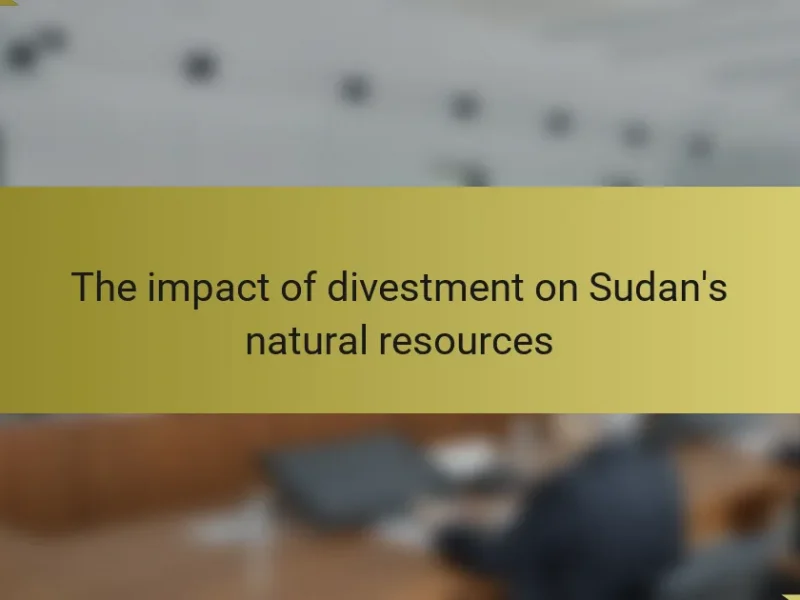Economic sanctions are restrictive measures imposed by countries to influence the behavior of a target nation, often involving trade barriers, tariffs, and financial restrictions. In the context of Sudan, divestment refers to the withdrawal of investments from companies operating there due to the country’s human rights violations. Economic sanctions against Sudan, enacted to compel governmental policy changes, have led to significant divestment, particularly from U.S. investors since the 1990s. These sanctions hinder Sudan’s economic development by restricting access to international markets, exacerbating poverty, and increasing unemployment. The article also highlights the importance of developing compliance frameworks for businesses to navigate the complexities of sanctions while mitigating risks associated with investments in sanctioned entities.
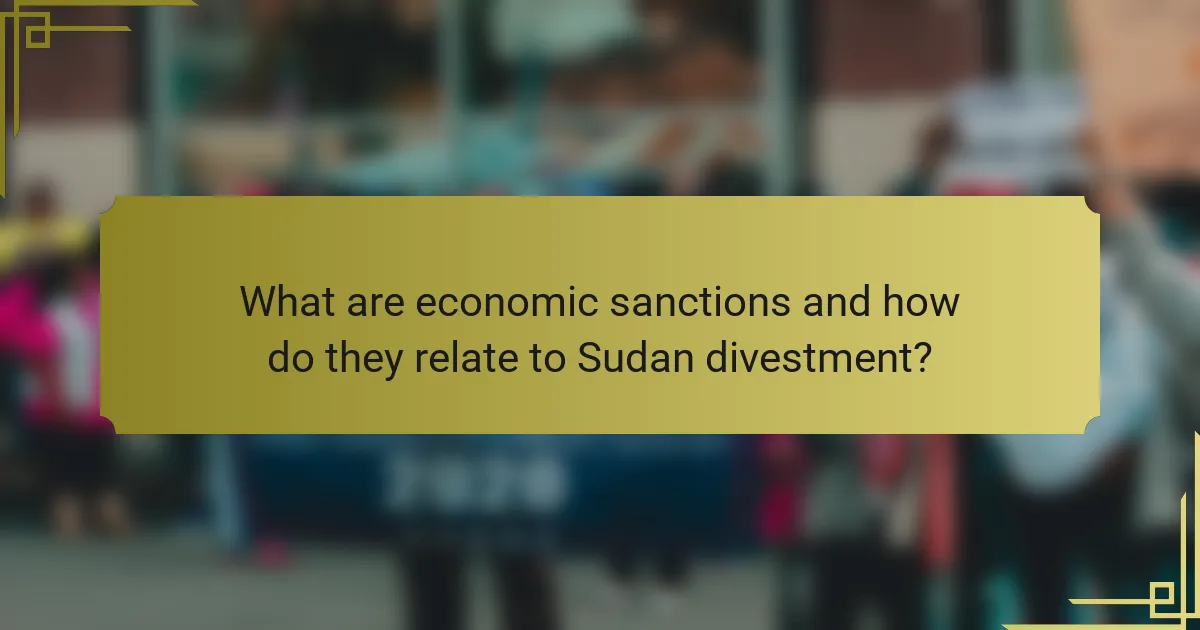
What are economic sanctions and how do they relate to Sudan divestment?
Economic sanctions are restrictive measures imposed by countries to influence the behavior of a target nation. They can include trade barriers, tariffs, and financial restrictions. Sudan divestment refers to the withdrawal of investments from companies operating in Sudan due to the country’s human rights violations and conflicts. Economic sanctions against Sudan have been enacted to pressure the government to change its policies. These sanctions often lead to divestment as investors seek to avoid financial ties with sanctioned entities. For instance, the U.S. government has applied sanctions against Sudan since the 1990s, prompting many investors to divest. Divestment efforts are seen as a way to support human rights and promote change in Sudan.
Why are economic sanctions imposed on Sudan?
Economic sanctions are imposed on Sudan primarily due to human rights violations and the government’s support of terrorism. The U.S. government designated Sudan as a state sponsor of terrorism in 1993. This designation led to significant economic restrictions. Additionally, the Sudanese government has been implicated in ethnic cleansing and war crimes, particularly in Darfur. These actions prompted international condemnation and sanctions from various countries and organizations. The sanctions aim to pressure the Sudanese government to change its policies and improve human rights conditions. Economic sanctions also restrict trade and financial transactions, impacting Sudan’s economy. The goal is to promote accountability and encourage democratic reforms in the country.
What specific actions trigger economic sanctions against Sudan?
Economic sanctions against Sudan are triggered by actions such as human rights violations, support for terrorism, and engaging in armed conflict. The U.S. government has historically imposed sanctions in response to the Sudanese government’s involvement in genocide, particularly in Darfur. Additionally, the Sudanese government’s links to terrorist organizations have led to further sanctions. Violations of international law and failure to comply with peace agreements also result in economic penalties. These sanctions aim to pressure the Sudanese government to change its policies and improve its human rights record.
How do these sanctions impact Sudan’s economy?
Sanctions significantly weaken Sudan’s economy. They restrict trade and foreign investment. This leads to reduced access to essential goods. Inflation rates increase due to limited supply. The Sudanese currency depreciates, further harming purchasing power. Key sectors like oil and agriculture suffer from decreased exports. Unemployment rises as businesses struggle to operate. Overall, these sanctions exacerbate poverty and economic instability in Sudan.
How does divestment play a role in the context of economic sanctions?
Divestment serves as a strategic tool in the context of economic sanctions. It involves withdrawing investments from entities that are targeted by sanctions. This action amplifies the financial pressure on those entities. For example, when investors divest from companies operating in sanctioned countries, it reduces their access to capital. In Sudan, divestment has been used to respond to human rights violations. Historical instances show that coordinated divestment campaigns can lead to significant economic consequences for targeted regimes. Moreover, divestment can signal disapproval of governmental actions and influence public opinion. Overall, divestment enhances the effectiveness of economic sanctions by creating additional economic isolation.
What are the different types of divestment strategies used against Sudan?
The different types of divestment strategies used against Sudan include targeted divestment, sector-specific divestment, and comprehensive divestment. Targeted divestment focuses on withdrawing investments from companies directly involved in human rights violations. Sector-specific divestment targets particular industries, such as oil or military sectors, that contribute to conflict. Comprehensive divestment involves a complete withdrawal of investments across all sectors related to the Sudanese economy. These strategies aim to pressure the Sudanese government to change its policies and improve human rights conditions.
How do divestment efforts align with the goals of economic sanctions?
Divestment efforts align with the goals of economic sanctions by targeting financial resources to pressure specific entities. Both strategies aim to limit the economic capabilities of a government or organization. Economic sanctions restrict trade and financial transactions. Similarly, divestment involves withdrawing investments from companies linked to undesirable practices. This withdrawal can reduce capital flow to those entities. For instance, sanctions against Sudan aimed to deter human rights abuses. Divestment from companies operating in Sudan supports the same objective by cutting off funding sources. Both approaches work in tandem to amplify the economic impact on targeted regimes.
What are the implications of economic sanctions for Sudan’s international relations?
Economic sanctions significantly impact Sudan’s international relations. They restrict trade, investment, and diplomatic engagement. This leads to isolation from global markets. Sudan faces difficulty in securing foreign aid and assistance. The sanctions hinder economic development and exacerbate humanitarian crises. Countries may hesitate to establish ties with Sudan due to potential backlash. Regional partnerships become strained as neighboring nations react to the sanctions. Overall, economic sanctions create a challenging environment for Sudan’s foreign relations.
How do sanctions affect Sudan’s trade partnerships?
Sanctions significantly hinder Sudan’s trade partnerships. They restrict access to international markets and financial systems. This leads to decreased foreign investment and trade opportunities. For instance, the U.S. imposed sanctions have limited Sudan’s ability to export oil, a key revenue source. Consequently, Sudan has faced economic isolation. The country struggles to engage with potential trading partners. These sanctions create distrust among international businesses. As a result, Sudan’s economy has faced substantial challenges.
What role does public opinion play in shaping sanctions against Sudan?
Public opinion significantly influences the formulation and implementation of sanctions against Sudan. Policymakers often consider public sentiment when deciding to impose or lift sanctions. A strong public outcry can lead to increased pressure on government officials to act against perceived injustices in Sudan. For example, campaigns advocating for human rights have historically swayed public opinion and prompted legislative action. Research indicates that public awareness of human rights violations can result in more stringent sanctions. Additionally, media coverage can amplify public concern, further motivating policymakers to respond. Thus, public opinion serves as a critical factor in shaping the landscape of sanctions against Sudan.
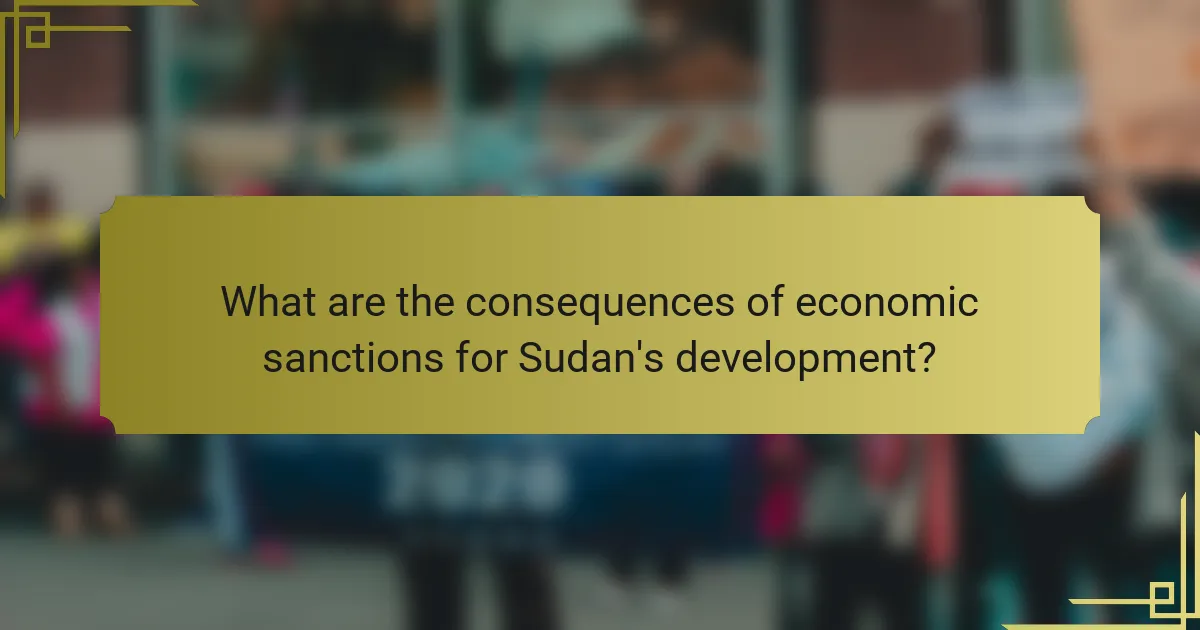
What are the consequences of economic sanctions for Sudan’s development?
Economic sanctions significantly hinder Sudan’s development. They restrict access to international markets and financial systems. This leads to reduced foreign investment. Consequently, economic growth is stunted. Sanctions also limit trade in essential goods, including food and medicine. This exacerbates poverty and health crises. Additionally, sanctions can result in increased unemployment rates. The overall economic instability further discourages domestic and foreign business initiatives.
How do economic sanctions affect Sudan’s social and political landscape?
Economic sanctions significantly impact Sudan’s social and political landscape. They lead to economic hardship, increasing poverty and unemployment rates. This economic strain often results in social unrest and protests against the government. The sanctions also limit the government’s ability to provide essential services, exacerbating public discontent. Politically, sanctions can weaken the ruling regime by reducing its financial resources. This can lead to increased opposition activity and calls for political reform. Additionally, the international isolation may hinder Sudan’s diplomatic relations, affecting foreign aid and investment. Historical instances, such as the sanctions imposed during the Darfur conflict, illustrate these effects on Sudan’s governance and societal stability.
What are the short-term effects of sanctions on Sudanese citizens?
Short-term effects of sanctions on Sudanese citizens include increased poverty and reduced access to essential goods. Citizens face higher prices for food and medicine due to supply chain disruptions. Employment opportunities decline as businesses struggle to operate under sanctions. Access to banking services is limited, complicating financial transactions. Humanitarian aid becomes harder to deliver, exacerbating health crises. Reports indicate rising malnutrition rates among vulnerable populations. Public services suffer from reduced funding, impacting education and healthcare. Overall, sanctions lead to immediate economic hardship for the general population.
How do sanctions influence governance and human rights in Sudan?
Sanctions significantly influence governance and human rights in Sudan by restricting economic resources and limiting governmental power. These measures often lead to economic instability, which can exacerbate existing governance challenges. For instance, the Sudanese government has faced difficulties in funding public services and infrastructure due to limited access to international markets. This financial strain can reduce the government’s ability to uphold human rights standards.
Moreover, sanctions can create a humanitarian crisis, impacting the population’s access to essential services. According to the United Nations, sanctions have contributed to increased poverty and food insecurity in Sudan. This situation can lead to civil unrest, as citizens demand better governance and respect for their rights.
In summary, sanctions in Sudan affect governance by limiting economic resources and can lead to human rights violations through increased poverty and instability.
What are the economic alternatives available to Sudan in response to sanctions?
Sudan can explore several economic alternatives in response to sanctions. These alternatives include diversifying trade partners to reduce dependency on sanctioned countries. Engaging with non-Western nations can open new markets for Sudanese goods. Additionally, Sudan may focus on boosting domestic production to decrease imports. Strengthening local industries can enhance self-sufficiency and resilience.
Investing in agriculture can also serve as a viable alternative. Agriculture is a significant sector in Sudan, providing employment and food security. Furthermore, Sudan can seek foreign investment from countries that do not impose sanctions. This investment can help develop infrastructure and create jobs.
Lastly, Sudan could explore cryptocurrency and other digital currencies for trade. This method can circumvent traditional banking systems affected by sanctions. Overall, these alternatives can help Sudan mitigate the impacts of economic sanctions.
How can Sudan diversify its economy to mitigate the impact of sanctions?
Sudan can diversify its economy by investing in agriculture, manufacturing, and tourism. Agriculture has the potential to enhance food security and export opportunities. Sudan has vast arable land and favorable climate conditions for various crops. Manufacturing can create jobs and reduce dependency on imports. Developing local industries can stimulate economic growth. Tourism can attract foreign investment and showcase Sudan’s cultural heritage. The country has historical sites and natural beauty that can be promoted. Diversifying these sectors can help reduce the economic impact of sanctions by creating alternative revenue streams.
What role do foreign investments play in overcoming economic challenges?
Foreign investments play a crucial role in overcoming economic challenges by providing capital, technology, and expertise. They help stimulate economic growth and create jobs. For instance, foreign direct investment (FDI) can lead to infrastructure development. According to the World Bank, countries that attract FDI often experience increased productivity and innovation. This is evident in nations that have successfully attracted foreign companies, which have boosted local economies. Furthermore, foreign investments can enhance access to international markets. As a result, they contribute to a more resilient economy capable of withstanding external shocks.
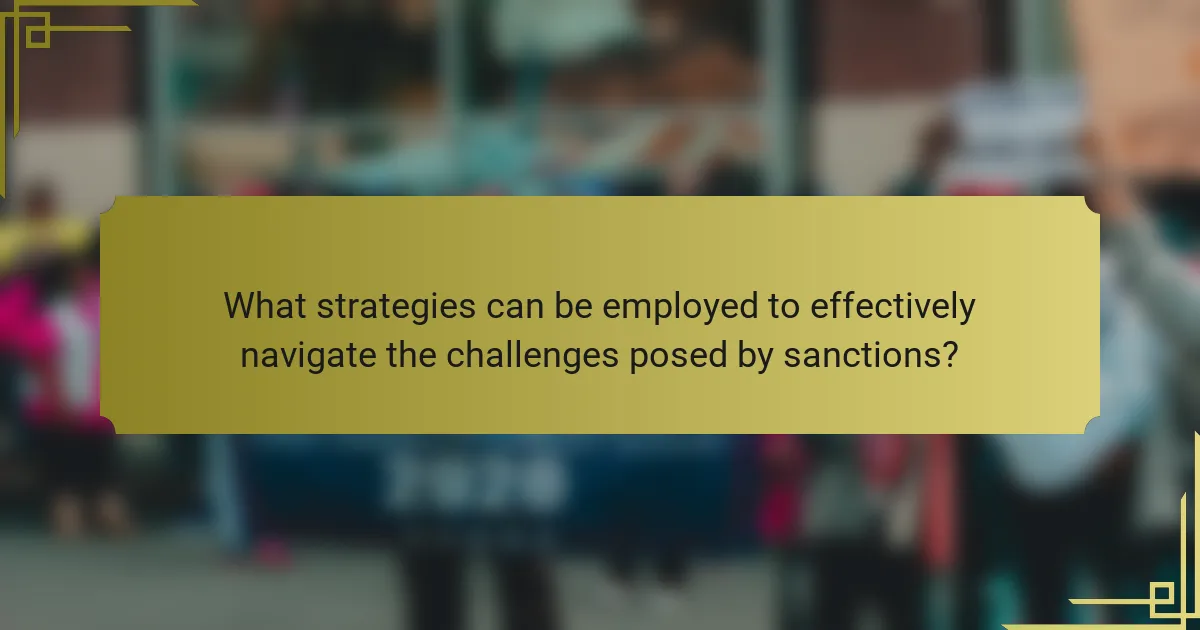
What strategies can be employed to effectively navigate the challenges posed by sanctions?
Developing comprehensive compliance frameworks is essential to navigate the challenges posed by sanctions. Companies should conduct thorough risk assessments to identify specific sanctions that apply to their operations. Regular training programs for employees can enhance awareness of compliance requirements. Establishing strong internal controls helps monitor transactions and identify potential violations. Engaging legal experts ensures that businesses stay updated on changing regulations. Building relationships with regulatory bodies can facilitate better communication and understanding of compliance expectations. Utilizing technology for tracking and reporting can streamline compliance processes. Lastly, diversifying supply chains may reduce reliance on sanctioned entities, mitigating risk exposure.
How can stakeholders advocate for change regarding economic sanctions on Sudan?
Stakeholders can advocate for change regarding economic sanctions on Sudan by engaging in dialogue with policymakers. They can present evidence of the negative impacts of sanctions on the Sudanese population. This includes highlighting how sanctions hinder access to essential goods and services. Stakeholders should collaborate with humanitarian organizations to gather data and testimonials. They can organize campaigns to raise public awareness about the humanitarian consequences. Additionally, stakeholders can lobby for targeted sanctions that minimize harm to civilians. Engaging with international bodies can also amplify their advocacy efforts. By building coalitions, stakeholders can present a unified front for change.
What role do NGOs and international organizations play in this process?
NGOs and international organizations play a crucial role in the process of economic sanctions and Sudan divestment. They advocate for human rights and monitor compliance with sanctions. These entities provide essential data and analysis on the impact of sanctions. They also engage in dialogue with governments and stakeholders to promote effective policies. NGOs often mobilize public opinion to raise awareness about the situation in Sudan. International organizations facilitate coordination among countries to ensure a unified approach. Their efforts can lead to increased pressure on the Sudanese government to comply with international norms. For example, organizations like Amnesty International have documented human rights abuses in Sudan, influencing sanctions discussions.
How can public awareness campaigns influence sanctions policy?
Public awareness campaigns can significantly influence sanctions policy by shaping public opinion and political discourse. These campaigns raise awareness about specific issues, such as human rights abuses or corruption, prompting citizens to demand action from their governments. Increased public pressure can lead policymakers to reconsider existing sanctions or implement new ones. For example, campaigns advocating for divestment from Sudan highlighted the humanitarian crisis, leading to stronger sanctions against the Sudanese government. Research shows that public mobilization can directly impact legislative decisions regarding sanctions. A study by the Center for American Progress found that grassroots movements effectively influenced U.S. foreign policy related to Sudan.
What best practices should businesses consider when dealing with Sudan divestment?
Businesses should prioritize compliance with international laws and regulations regarding Sudan divestment. This includes understanding the specific sanctions imposed by the United States and the European Union. Companies must conduct thorough due diligence to identify any potential exposure to Sudanese entities. It is essential to assess the risks associated with existing investments in Sudan. Businesses should also develop a clear divestment strategy that aligns with ethical considerations and corporate social responsibility. Engaging with stakeholders, including investors and customers, can provide valuable insights during the divestment process. Regularly reviewing and updating policies related to divestment is vital to ensure ongoing compliance. Finally, companies should document their divestment actions to maintain transparency and accountability.
How can companies ensure compliance with sanctions while engaging in Sudan?
Companies can ensure compliance with sanctions while engaging in Sudan by conducting thorough due diligence. This involves assessing all applicable sanctions regulations. Companies should regularly review updates from relevant authorities, such as the U.S. Treasury’s Office of Foreign Assets Control (OFAC). Training employees on compliance protocols is essential. Implementing robust internal controls helps monitor transactions. Engaging with legal experts specializing in sanctions can provide clarity. Utilizing compliance software can automate monitoring processes. Regular audits of business operations ensure ongoing adherence to sanctions. These measures collectively reduce the risk of non-compliance.
What are the risks and opportunities for businesses in a divestment context?
Businesses face several risks and opportunities in a divestment context. Risks include potential loss of revenue from exiting markets and damage to brand reputation. Companies may also encounter legal challenges or regulatory scrutiny during the divestment process. Additionally, there is a risk of asset devaluation, which can impact financial stability.
On the other hand, opportunities arise from the potential to reallocate resources to more profitable ventures. Divestment can also enhance a company’s focus on core competencies and improve operational efficiency. Furthermore, aligning with ethical standards can strengthen stakeholder trust and attract socially conscious investors.
In the context of Sudan, divestment may mitigate risks associated with economic sanctions and enhance compliance with international laws. This strategic shift can position businesses favorably in markets that prioritize ethical practices.
Economic sanctions are restrictive measures imposed by countries to influence the behavior of a target nation, specifically relating to Sudan’s human rights violations and conflicts. The article explores the connection between these sanctions and Sudan divestment, detailing how divestment serves as a strategic tool to amplify economic pressure on the Sudanese government. Key aspects include the triggers for sanctions, their impact on Sudan’s economy and international relations, and the various divestment strategies employed. Additionally, the article examines the implications of sanctions on governance, human rights, and potential economic alternatives for Sudan.
